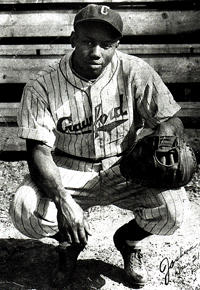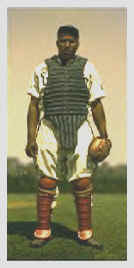
Josh Gibson
Dec. 21.1911 - Jan. 20. 1947

Josh Gibson
Dec. 21.1911 - Jan. 20. 1947
I love baseball, have all my life. I've watched it and
participated in it all my life. (Even now, at the age of
37, I still play in a Senior League. Real hardball. At Deerfoot Park,
a triple-A sized field. 330 down the
lines, 400 to centre, the power allies a tempting 365. Weekend warriors
risking life, limb and livelihood for
the chance to feel like a kid again.)
When I was a kid growing up in Saskatoon during the 70's, my favourite
team was the Boston Red Sox.
My favourite player was Jim Rice. It never crossed my mind to NOT cheer
for him because of his colour. I
was about 13 when I became aware that at one time black players weren't
allowed to play in the Major
Leagues. I read Jackie Robinson's autobiography and then wrote a report
on his courage and fortitude for
my English class. After that I tore down to my favourite hangout outside
of a ball field or basketball court -
the Public Library.
I had always gone down there and poured through the big
Reference books that you weren't allowed to
sign out. Especially if I had to do an essay on Napoleon or Admiral
Nelson. You had to take notes in the
reading area and return the books promptly after use. They frowned
on the use of the photocopier to copy
pages, but I did it anyway. For fun I used to read the huge tomes on
the history of Major League baseball
and 'The World Series'. I had absorbed the tradition and history of
the game, yet had hardly read anything
on the Negro Leagues. Or found an explanation as to why there was a
colour line in the first place.
I was in luck that day. They had just got a copy of "When
Only The Ball Was White." And it wasn't a
Reference book! I signed it out and read it over and over for weeks.
It was eye-opening. Never again would I
have that innocent outlook on the sport.
Something had stunk like hell in baseball for a long
time. While White America celebrated the likes of
Babe Ruth, Ty Cobb and Christy Mathewson they tacitly ignored the abilities
and achievements of black players.
I learned that back in 1883, during the reformation after
the Civil War, two black players, Fleetwood
Walker and his brother Welday, joined the Toledo Blue Stockings. This
was a problem for the Southern
players. There was a strong undercurrent of 'backlash' against the
reformation. Yankee carpetbaggers and
'nigger lovers' were hated by these very bitter ex-Confederates. Led
by Cap Anson, the Southern players
threatened to boycott the League (the National Baseball Association,
it was called at the time, I think.) if
black players were allowed to compete against whites. The typical reasons
were that fans wouldn't come
to the games, the white players would lose jobs. That black players
may be athletic, but that they were
lazy and prone to 'mental' errors. (wink, wink). They even used religion
to say that God meant blacks to be
servile and were not the equals of white men. ( You know, the story
of God turning Noah's son Black for
some Transgression. Condemns him thus (paraphrasing): You and all your
descendants shall be hewers of
wood and drawers of water, to remain in servitude to your betters.)
The League caved in, afraid of alienating their prime source
of talent. Nearly all the best players came
from the sunny South where the youngsters could hone their skills year
round. And the unofficial
gentleman's agreement of barring "coloured" ball players was born.
Not all whites were happy with this.
John McGraw, the colourful and brilliant Manager of the New York Giants
often tried to slip 'coloured'
players into his line up, claiming they were Cuban. It sometimes worked.
His reasoning was that if a player
could cut it, that it shouldn't matter what his skin colour was. His
enemies called him a cheater and a 'win
at all costs' kind of guy. McGraw was before his time.
Branch Rickey, who would later break the colour line by
signing Jackie Robinson, related a personal
story. He was the coach and seminary teacher for Wesleyan (Ohio) College.
He had a black player on his
team. On one road trip, this player was not allowed to eat in the dining
room with his teamates and they
tried to keep him out of the hotel. Mr. Rickey's defiant personality
won the day, and he was allowed to
stay. But only in Mr. Rickey's room where he could be 'under supervision'.
After getting back to his room,
he saw the poor guy pouring water over his hands and scrubbing away.
"I'm sorry, Mr. Rickey. No matter
how hard I scrub, this damn skin stays black." Branch Rickey's eyes
filled with tears everytime he related
that story.
On to the subject of Josh Gibson, without any doubt the
greatest slugger of his time. At 6 foot 2 and 220
lbs, he was an imposing figure during an era when the players were
much smaller in physical stature than
today. The Negro Leagues statistics are sketchy at best, but it's been
estimated he hit over 800 career
Home Runs. They say he hit 84 in one particular year. He was a rocking-chair
Catcher with a great arm.
On the bases he had awe-inspiring speed and instincts. He was a hit
with both fans and competitors. He
had a comic sense of humour and a carefree, accepting personality.
His loud, thundering voice constantly
directed traffic for his fielders. Friends say he was always laughing
and smiling in those early days. Before
the bitterness overtook him later in life.
In his career that stretched from 1927 to 1946, he played for
the top two Negro League teams. The
Pittsburgh Crawfords and the Homestead Grays. In the Coloured Community
he was celebrated and
idolized. White America heard the odd rumbling, but primarily viewed
the Negro Leagues as Second Class
if not Beneath Contempt.
In the many exhibition games played between White major
leaguers and the Negro Leaguers,
contemporary accounts make it quite clear that the black players more
than held their own.
They did keep stats on those ones, Josh hit .412 playing against
white pitchers. Guys like Carl Hubbell,
Dizzy Dean and Walter Johnson. Dizzy were known to say, "If
we (the St. Louis Cardinals) had Satchel
and Josh, we'd have the Pennant wrapped up
by July, and we could take the summer off fishin'
and huntin'. Then we'd come back
in October and whip the Yankees without breakin' a sweat."
Josh often teamed up with battery mate Satchel Paige to
go barnstorming the American and Canadian
farm Belt spreading his myth and legend far and wide. In 1940 and 1941,
Josh and Satch played for the
Veracruz team in the Mexican League and they won two championships.
Josh hit .467 in 1940, .480 with
33 HR and 124 RBI in only 94 games in 1941. Those Mexican players weren't
chumps either, they could
play. They had also suffered the discrimination that faced the American
blacks. If they weren't 'white'
enough, tough luck.
In his last year in 1946, Josh hit .361 with the Homestead
Grays, despite suffering from manic behaviour
and alcohol addiction. Some say he may have had a bi-polar disorder
or some kind of manic-depressive
chemical imbalance. Some say it was the drinking that drove his inner
demons.
There was no secret of Josh's desire to play in the Major
Leagues. Satchel and Josh ruminated often
about their chances of making it. Some say when Jackie was picked by
Mr. Rickey to be the One, Josh
was crushed. There are stories that Mr. Rickey explained his reasons
to Josh himself. They say that Mr.
Rickey was haunted to the end of his days by the spectre of the huge,
hulking figure breaking down and
lamenting his bad fortune to be born too late.
On January 20, 1947, Josh Gibson met his maker. He had
been fighting headaches all day. He went to a
movie, hoping that the dark theatre would ease his pain. After it was
over, Josh was found by the other patrons
unconscious in his seat. A doctor was called, Josh was moved to his
mother's house and given a sedative.
His sister Annie recalls that Josh woke up in the middle of the night
and had all his trophies brought to his room.
Later, he awoke again and sat up. He mumbled a few words, lay down
and died. His life's dream never realized.
Of all the great black players who never got a fair opportunity
to excel in the Major Leagues, Josh Gibson
looms as the most tragic. He was called the black "Babe Ruth", and
the story goes that Babe was honored
to be compared to him. When Satchel Paige finally made it to the Major
Leagues as a 40-something rookie he
lamented, "This would be a lot more satisfying
if Josh was here to share it with me."
In the film, "Field of Dreams", the ghosts who come back
to play in Kevin Costner's cornfield don't invite Ty Cobb
along. "Nobody could stand that bastard anyway," one character opines.
Ty Cobb, although a great ballplayer, was a
notorious right wing, gun toting, racist and bigoted son of a bitch.
In a perfect world, Ty Cobb would have been forced
to match his skills against ALL the best players of his day.He was
one that consciously avoided it.
One day, an exhibition game was to be held matching up
All Star teams. To promote ticket sales in the black
community, they signed "Smoky" Joe Williams to pitch for the team Ty
Cobb was to play against. When Ty found out
he walked out on his commitment to play even in the face of a lawsuit
promised by the promoter. "I ain't playin'
against no Nigra, it ain't proper. Us Southern
folk are against Race Mixing." Not to mention the fact that
"racial" superiority is hard to proclaim after getting outsmarted and
outplayed by a member of an 'inferior' race.
If there is such a thing as a divine justice,a 'true' field
of dreams, Ty Cobb is sitting on the bench for eternity.
Second on the depth chart behind a better, coloured ballplayer. And
Josh is flashing his big smile and letting loose
with his rolling, booming laughter. "See?
I always knew if I got the chance, I'd put ol' Ty in his place."

Josh Gibson's legend survived his death.
His story will always remain a testament to the courage and fortitude
of the Afro-American Experience.
This is a quote that seems to sum up his philosophy:
"Death ain't nothing, I done seen him, done
wrassled with him.
You can't tell me nothing about death.
Death ain't nothing but a fastball
on the outside corner"
For more info go to www.negroleaguebaseball.com